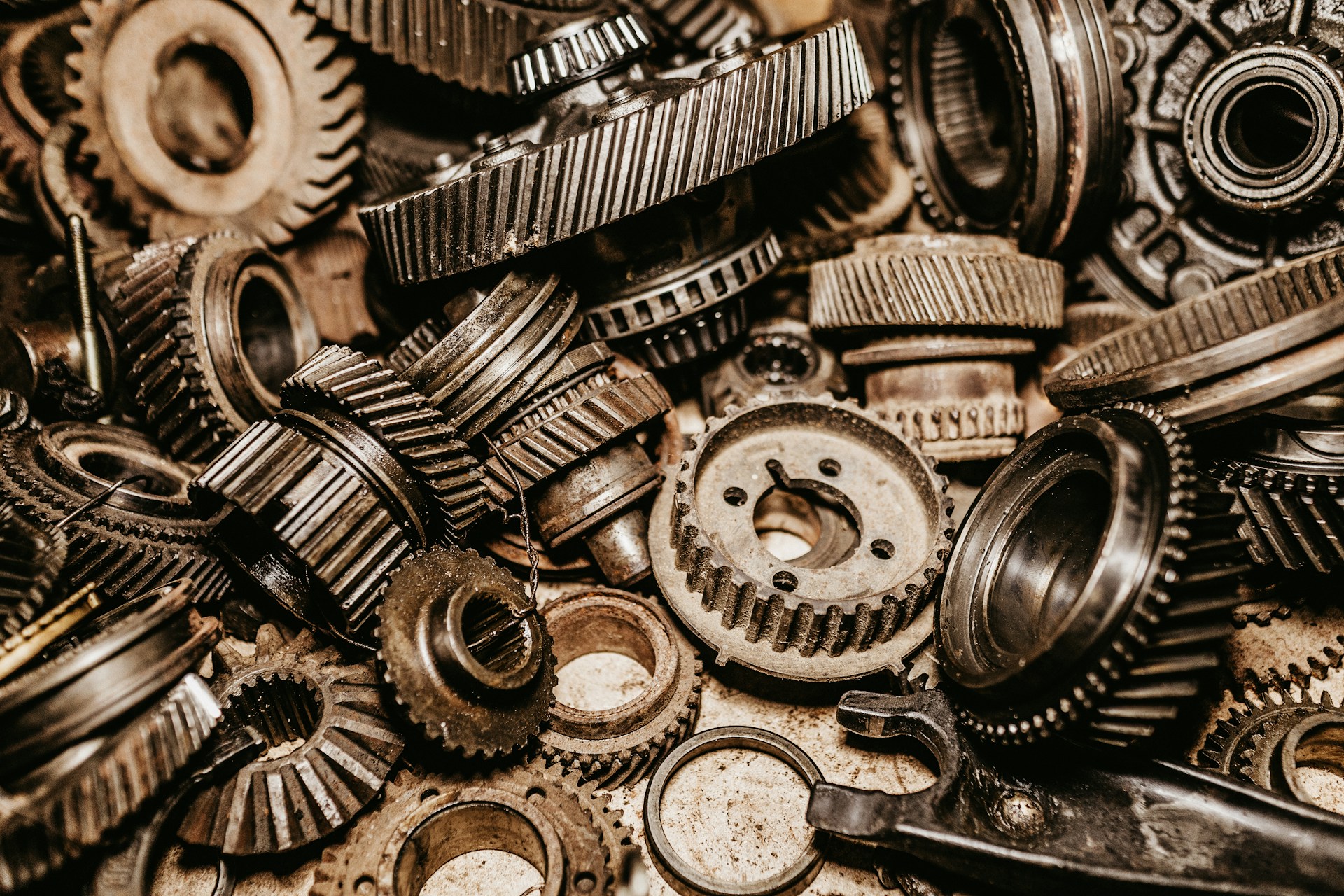


Introduction
Welcome to our blog post on the fascinating world of scrap metal! Whether you're a general homeowner or a construction business owner, understanding the differences between ferrous and non-ferrous scrap metal can be incredibly beneficial. From recycling to selling, knowing the characteristics and value of these metals can help you make informed decisions and potentially save you some serious cash. So, grab a cup of coffee and join us as we delve into the intriguing realm of ferrous and non-ferrous scrap metal!
Picture this: you're cleaning out your garage or demolishing an old structure, and you come across a pile of metal scraps. You may be tempted to toss it all in the same bin, assuming it's all the same. But here's where things get interesting – not all scrap metal is created equal! Enter the world of ferrous and non-ferrous metals, two distinct categories that determine the composition, magnetic properties, and overall value of the scraps you've stumbled upon.
Imagine walking through a scrap yards near me, surrounded by piles of discarded metal objects. Have you ever wondered what happens to all that scrap metal? How it is sorted and recycled? Well, understanding the difference between ferrous and non-ferrous scrap metal is the first step in unraveling the mysteries of the recycling industry. In this blog post, we will delve into the magnetic properties of these metals, their uses, and the environmental and financial benefits of recycling them.
Grasping And Understanding The Difference Between Ferrous and Non-Ferrous Scrap Metal Recycling
When it comes to scrap metal recycling, there are two main categories: ferrous and non-ferrous metals. Ferrous metals contain iron, while non-ferrous metals do not. This distinction is crucial because it determines how these metals are sorted, processed, and ultimately recycled.
Ferrous metals, such as steel and iron, are widely used in construction, automotive, and manufacturing industries due to their strength and durability. On the other hand, non-ferrous metals, including copper, aluminum, and brass, are valued for their corrosion resistance, electrical conductivity, and lightweight nature.
Understanding the difference between these two types of metals is essential for efficient and effective scrap metal recycling. Proper sorting ensures that each metal type is recycled appropriately, reducing waste and maximizing the value of the materials.
Magnetic Properties of Ferrous and Non-Ferrous Scrap Metal
The magnetic properties of ferrous and non-ferrous metals play a crucial role in their identification and separation. Ferrous metals are magnetic, which means they can be easily separated from non-ferrous metals using powerful magnets. This magnetic property makes the recycling process more efficient, as ferrous metals can be quickly extracted from a mixed batch of scrap metal.
Non-ferrous metals, on the other hand, are non-magnetic. This means they do not stick to magnets and cannot be separated using traditional methods. Instead, non-ferrous metals are sorted based on their physical properties, such as color, density, and conductivity.
By understanding the magnetic properties of these metals, scrap metal recyclers can efficiently sort and process large quantities of material, ultimately reducing waste and conserving resources.
A Complete Guide to Ferrous Scrap Metals
Ferrous metals, mainly steel, and iron, are widely used in various industries due to their exceptional strength and durability. Steel, for example, is a common material in construction, automotive manufacturing, and shipbuilding. Iron, on the other hand, is used in the production of machinery, tools, and appliances.
One of the key reasons for the importance of ferrous scrap metals is their ability to be recycled without losing their inherent properties. Recycling ferrous scrap metals helps conserve natural resources and reduces energy consumption and greenhouse gas emissions. By recycling steel, for example, we can save up to 74% of the energy required to produce new steel from raw materials.
Furthermore, recycling ferrous scrap metals helps reduce the reliance on mining, which can have detrimental environmental impacts such as deforestation, habitat destruction, and water pollution. By choosing to recycle ferrous metals at your local scrap yards near me, we can contribute to a more sustainable and eco-friendly future.
Uses of Ferrous Scrap Metals
Ferrous scrap metals have a wide range of uses due to their strength, durability, and versatility. Steel, for instance, is used in the construction of buildings, bridges, and infrastructure projects. It is also a vital component in the manufacturing of vehicles, appliances, and machinery.
Moreover, iron is widely used in the production of steel, which is the backbone of the automotive industry. From car bodies to engines, iron plays a crucial role in ensuring the durability and safety of vehicles.
By recycling ferrous scrap metals, we can ensure a continuous supply of these essential materials, reducing the need for new products and minimizing the strain on natural resources.
Uses of Non-Ferrous Scrap Metal
Non-ferrous scrap metals, such as copper, aluminum, and brass, have a wide range of applications due to their unique properties. Copper, for example, is an excellent conductor of electricity and is used in electrical wiring, plumbing systems, and electronic devices. Aluminum, known for its lightweight nature and corrosion resistance, is used in the production of aircraft, beverage cans, and car parts.
Brass, a combination of copper and zinc, is valued for its aesthetic appeal and is commonly used in musical instruments, decorative objects, and plumbing fixtures. The versatility and recyclability of non-ferrous metals make them highly valuable in various industries.
By recycling non-ferrous scrap metals at your local scrap yards near me, we can not only conserve natural resources but also reduce the energy consumption associated with mining and processing these metals from raw materials. Recycling just one ton of aluminum, for example, saves up to 95% of the energy required to produce the same amount of aluminum from bauxite ore.
The Benefits of Selling Your Scrap Metal at a Scrap Yard Junkyard Near Me
If you have scrap metal lying around your property, selling it at your local scrap yards near me can have several benefits, both for the environment and your wallet.
Environmental Impact: By selling your scrap metal to Bob's Auto And Salvage scrap yard near me, you are contributing to the circular economy, where materials are reused rather than discarded. Recycling scrap metal reduces the need for new production, conserves natural resources, and minimizes the environmental impact of mining and manufacturing processes.
Financial Gain: Selling your scrap metal can also provide a financial incentive. Depending on the type and quantity of metal you have, you can earn money by selling it to Bob's Auto And Salvage. Additionally, some recycling meal centers may offer higher prices for clean and well-sorted scrap metal, as it requires less processing and can be quickly sold to end-users.
Convenience: Junkyards near me are often conveniently located, making it easy to drop off your scrap metal and earn some extra cash. Many junkyards accept a wide range of metals and provide a hassle-free process for selling your scrap metal.
By understanding the difference between ferrous and non-ferrous scrap metal, we can make informed decisions about recycling and contribute to a more sustainable future. Whether it's the magnetic properties, the importance of ferrous scrap metals, or the versatile uses of non-ferrous metals, every piece of scrap metal has the potential for a new life. So, the next time you come across a pile of scrap metal, remember the valuable resources that lie within and consider recycling them at a local junkyard near you.
Conclusion
The Importance of Ferrous and Non-Ferrous Metals in Scrap Metal Recycling;
After diving into the world of scrap metal recycling, it becomes clear that understanding the differences between ferrous and non-ferrous metals is crucial. The magnetic properties of ferrous metals and their comprehensive guide shed light on the unique characteristics that make them so valuable in various industries. From construction to automotive manufacturing, ferrous metals play a vital role in our everyday lives. Their importance stems from their strength, durability, and versatility.
On the other hand, non-ferrous metals have their own set of uses and benefits. While they may not possess the magnetic properties of their ferrous counterparts, they offer advantages such as resistance to corrosion and greater electrical conductivity. These qualities make non-ferrous metals ideal for applications in electronics, aerospace, and even jewelry making.
So, what can you do with your scrap metal? Well, selling it to reputable Butler scrap yards near me at Bob’s Auto and Salvage not only benefits the environment but also your wallet. By recycling your scrap metal, you contribute to the reduction of waste and the conservation of natural resources. Additionally, you can earn some financial gain by exchanging your scrap metal for cash, all while enjoying the convenience of a nearby location.
Interested in learning more about the world of scrap metal recycling? Click on the website link for more information and call us to find out how you can make the most of your scrap metal. Whether you have ferrous or non-ferrous metals, recycling them is not only beneficial but also a rewarding experience. Start making a difference today by recycling your scrap metal and join the movement towards a sustainable future.
If you are located in the Butler area and are looking for a high-quality scrap metal center or need assistance with the removal of various metals and recyclable materials, Bob’s Auto and Salvage is here to help. We have a team of experts who work with clients and partners like yourself every day, providing reliable and efficient recycling services and we pay cash.
For immediate assistance, please don't hesitate to give us a call at (412) 285-1900 today. Or fill out the contact form and we will be back in touch soon
We look forward to hearing from you soon!
Featured Company
Related Posts
Contact Us
Ferrous and Non-Ferrous Scrap Metal


Service Locations:
Copyright 2024: Scrap Yard Near Me - All Rights Reserved
Powered By: Digital Intent Marketing





